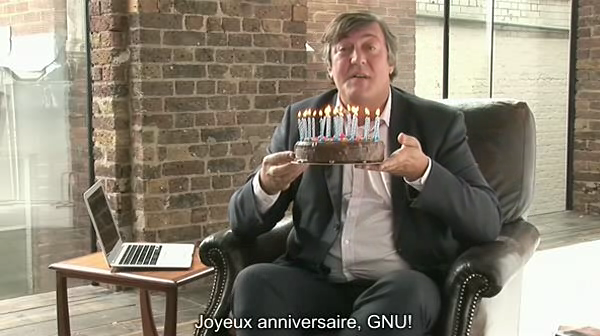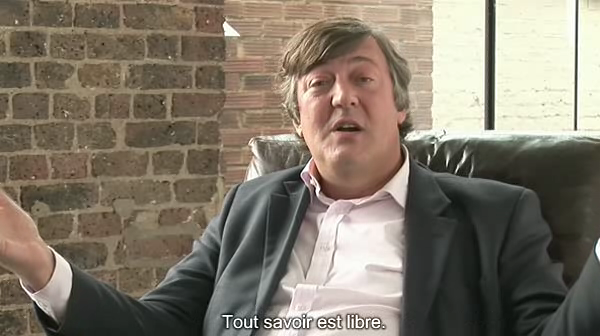Happy Birthday to GNU
Le projet GNU viens de fêter ses 25 ans (le 27 septembre), et la FSF à sorti a ce sujet un court métrage intitulé "Happy Birthday to GNU" dans lequel joue Stephen Fry (un acteur anglais).

En l'espace de 5 minutes, Fry compare le logiciel libre à une "bonne science" en contraste avec la "tyrannie" imposée par l'industrie propriétaire...
L'adresse du film (sous titré français) (34,3 Mo) : Stephen_Fry-Happy_Birthday_GNU-hq_600px_780kbit_fr.ogv
L'aide pour lire cette vidéo est sur cette page.
- Réalisation : Matt Lee
- Durée : 5 mn 50 s
- Date : 2008
- Langue : Anglais sous-titré
- Licence : Creative Commons Attribution-No Derivative Works 3.0 United States License.
- Sources transcription et traduction.
Transcription
Computers. I've loved them since I've been able to afford to have my own, back in the beginning of the modern home computer era, the 1980s. And I've owned a large number of different kinds of computer and I've expressed, publicly, loyalty to this kind or that kind. But recently my mind has turned, as many people's have, to this whole business of Free Software. There is a lot of confusion about what this means and I'd like to help clear it up because this happens to be a year of celebration, and I want to help us all celebrate it and to look forward to the future of Free Software.
If you have —I don't know— plumbing in your house, it may be that you don't understand it, but you may have a friend who does and they may suggest you move a pipe here, a stopcock there, or a valve somewhere else. And you're not breaking the law by doing that, are you? Because it's your house and you own the plumbing. You can't do that with your computer. You can't actually fiddle with your operating system, and you certainly can't share any ideas you have about your operating system with other people because Apple and Microsoft, who run the two most popular operating systems, are very firm about that fact that they own that and no one else can have anything to do with it.
Now this may seem natural to you: "Why shouldn't they?" But actually, Why can't you do with it what you like? And why can't the community, at large, alter, and improve, and share? That's how science works, after all... All knowledge is free, and all knowledge is shared in good science. If it isn't -- it's bad science and it's a kind of tyranny.
And this is, really, where it all started. A man called Richard Stallman, who decided 25 years ago, almost to this very day, to write a whole new operating system from the ground up. He called it GNU, which stands for "GNU is Not Unix" because it isn't. It is similar to Unix, in many ways, but every element of it, every module, every little section of the code (and it's a gigantic code because it's to run on many many platforms) is run by the community, is run by coders "out there" who are welcomed in to the GNU community, to help improve the software. Every "distro", as they are called, every distribution of GNU, is tested, and worked upon, and refined by people whose only interest is in creating the perfect operating system that can be used across the spectrum of platforms and by as many users as possible.
Now, there came a time when the kernel, which is the central part of an operating system, needed to be written. And a man called Linus Torvalds, of whom you may have heard, wrote the kernel and it was named after his name, Linux (line-ucks) or Linux (Lin-ucks) as some people pronounce it. And Linux is the kernel that runs within GNU and I'm here simply to remind you that GNU and Linux are the twin pillars of the Free Software community: people who believe, and this is the important part, that software should be Free, that the using community should be allowed to adapt it, and adopt it, to change it, to improve it, and to spread those improvements around the community, like science. That's basically what it is saying. In the same way that good scientists share everything and all knowledge is open and free, so it should be with an operating system.
So, if you're a supporter of GNU, if you're a supporter of Linux, and the Free Software Foundation, "Well, what can I do?", you are probably wondering. The most obvious thing you can do is use a GNU/Linux operating system on your own computer. It's a lot easier than you might think. Go to gnu.org and see if you can find a distribution that suits you. Probably, if you like a good graphical user-interface, something like g-New-Sense, gNewSense. You'll see it there on gnu.org. Or, if you're a really smart cookie, you might want to do your own coding. You might want to contribute to the sum of knowledge that makes GNU and Linux what they are.
Either way, I hope you will join me in wishing GNU a very happy twenty-fifth birthday. Lets do that now actually...
So, "Happy birthday, GNU!" Twenty-five years old. The operating system of the future. Freedom! < huff >
Chocolaty good. The tastiest operating system in the world... and it's all free.
Traduction
Note : reformatée de la version "sous-titres" faite par Jeanne Rasata (http://www.gnu.org/fry/happy-birthday-to-gnu-french.srt).
Les ordinateurs ! Je les ai aimés depuis que j'ai eu pour la première fois les moyens de m'en procurer un, au tout début de l'ère de l'ordinateur personnel, durant les années 80. J'ai été propriétaire d'une grande variété d'ordinateurs et j'ai exprimé publiquement ma loyauté à un tel ou à un tel autre modèle... mais, ces derniers temps, je me tourne, comme beaucoup d'autres, vers le Logiciel Libre.
Il y a beaucoup de confusions autour de la signification de « Logiciel Libre », et j'aimerais aider à éclairer le sujet, parce qu'il se trouve que c'est une année de célébration, et je veux nous aider tous à la célébrer, et à anticiper l'avenir du Logiciel Libre.
Si vous avez, disons... de la plomberie chez vous, il est possible que vous n'en compreniez pas le fonctionnement, mais que vous ayez un(e) ami(e) qui le comprenne. Et il/elle pourrait vous suggérer de déplacer un tuyau par-ci, un robinet d'arrêt par-là, une valve autre part. Et vous n'enfreindriez pas la loi en faisant cela, n'est-ce pas ? Parce que c'est votre maison et votre propre plomberie. Vous n'en auriez pas le droit avec votre ordinateur : vous ne pouvez pas réellement bricoler votre système d'exploitation. Et il serait hors de question que vous partagiez quelques idées que vous ayez au sujet de votre système d'exploitation avec d'autres personnes, parce que Apple et Microsoft, qui gèrent les deux systèmes d'exploitation les plus répandus, clament qu'elles en sont les propriétaires, et que personne d'autre ne peut y toucher.
Ceci pourrait vous sembler normal « Pourquoi ne le seraient-elles pas ? » Mais en fait, pourquoi ne pourriez-vous pas en faire ce que vous voulez ? Et pourquoi la communauté dans son ensemble n'aurait-elle pas le droit de modifier, d'améliorer, et de partager ? Il en est ainsi dans le domaine de la science, après tout... Tout savoir est libre. Quand la science est bonne, toute connaissance est partagée. Si cette dernière ne l'est pas, la science est mauvaise, et est une sorte de tyrannie.
Et c'est ici que tout commence véritablement, avec un homme qui s'appelle Richard Stallman. Il a décidé, il y a de cela presque vingt-cinq ans, d'écrire un nouveau système d'exploitation à partir de zéro. Il a appelé ce système GNU, qui veut dire « GNU's Not Unix » (c'est-à-dire : « GNU n'est pas Unix »), parce que GNU n'est en effet pas UNIX. Il ressemble à Unix, à plus d'un titre, mais chaque élément, chaque module, chaque section du code (et c'est un code gigantesque parce qu'il est exécuté sur plusieurs plate-formes) est développé par une communauté, géré par des programmeurs, qui sont tous les bienvenus dans la communauté GNU, pour aider à améliorer le logiciel. Chaque « distro », comme on les appelle, chaque distribution de GNU est testée, travaillée, et peaufinée par des personnes dont le seul intérêt est de créer un système d'exploitation parfait qui pourra être utilisé sur quelque plate-forme que ce soit par autant d'utilisateurs que possible.
Est venu le temps où il fallut écrire le noyau, le cœur du système d'exploitation. Un homme nommé Linus Torvalds, a écrit ce noyau. Il en est l'éponyme. Le noyau s'appelle Linux (prononciation britannique), ou Linux (prononciation américaine) comme certains le prononcent. Et Linux est le noyau qui s'exécute à l'intérieur de GNU. Je suis ici, en quelque sorte, simplement pour vous rappeler que GNU et Linux sont les piliers jumeaux de la communauté du Logiciel Libre. Une communauté de personnes qui croit, et ceci est ce qui importe, que les logiciels devraient être libres, et que la communauté d'utilisateurs devrait avoir le droit de les adapter, de les adopter, de les changer, de les améliorer, de répandre leurs améliorations à travers la communauté, comme en science. C'est, grosso modo, ce qu'elle dit. De même que les bons scientifiques partagent tout et que toute connaissance est ouverte et disponible pour chacun, ainsi devrait-il en être avec un système d'exploitation.
Si vous êtes un supporter de GNU, si vous êtes un supporter de Linux, et de la Fondation du Logiciel Libre, vous vous demandez probablement « Bien, que puis-je faire ? ». La chose la plus évidente que vous puissiez faire est d'utiliser un système d'exploitation GNU/Linux sur votre propre ordinateur. C'est beaucoup plus facile que vous ne le croyez ! Visitez le site Web gnu.org pour voir s'il y a un système d'exploitation qui vous convient. Peut-être, si vous aimez une bonne interface graphique, quelque chose come g-New-Sense, gNewSense. Vous le trouverez sur gnu.org. Ou bien, si vous êtes un spécialiste, il vous plairait peut-être de programmer. Il vous plairait peut-être de contribuer à la totalité de la connaissance qui fait de GNU et de Linux ce qu'ils sont.
De toute manière, j'espère que vous vous joindrez à moi pour souhaiter à GNU un très joyeux 25ème anniversaire. Faisons-le maintenant. Joyeux anniversaire, GNU ! 25 ans. Le système d'exploitation du futur. Liberté ! Miam, ça fond sous la dent ! Le plus savoureux système d'exploitation du monde... et il est complètement libre.













